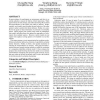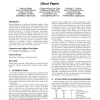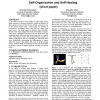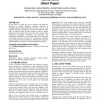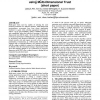ATAL
2008
Springer
15 years 3 months ago
2008
Springer
Mechanism design (MD) has recently become a very popular approach in the design of distributed systems of autonomous agents. A key assumption required for the application of MD is...
109
click to vote
ATAL
2008
Springer
15 years 3 months ago
2008
Springer
In open settings, the participants are autonomous and there is no central authority to ensure the felicity of their interactions. When agents interact in such settings, each relie...
107
click to vote
ATAL
2008
Springer
15 years 3 months ago
2008
Springer
Reward shaping is a well-known technique applied to help reinforcement-learning agents converge more quickly to nearoptimal behavior. In this paper, we introduce social reward sha...
ATAL
2008
Springer
15 years 3 months ago
2008
Springer
This paper discusses the application of distributed constraint optimization to coordination in disaster management situations under sub-optimal network conditions. It presents an ...
102
click to vote
ATAL
2008
Springer
15 years 3 months ago
2008
Springer
As the ability to produce a large number of small, simple robotic agents improves, it becomes essential to control the behavior of these agents in such a way that the sum of their...
116
click to vote
ATAL
2008
Springer
15 years 3 months ago
2008
Springer
Modeling synthetic characters which interact with objects in dynamic virtual worlds is important when we want the agents to act in an autonomous and non-preplanned way. Such inter...
117
click to vote
ATAL
2008
Springer
15 years 3 months ago
2008
Springer
This work presents a best-first anytime algorithm for computing optimal coalition structures. The approach is novel in that it generates coalition structures based on coalition va...
103
click to vote
ATAL
2008
Springer
15 years 3 months ago
2008
Springer
In this paper, we study the role of emotions and expressive behaviour in socially interactive characters employed in educational games. More specifically, on how we can use such e...
ATAL
2008
Springer
15 years 3 months ago
2008
Springer
Multi-agent teams must be capable of selecting the most beneficial teammates for different situations. Multi-dimensional trustworthiness assessments have been shown significantly ...
117
click to vote
ATAL
2008
Springer
15 years 3 months ago
2008
Springer
In this paper, we deal with the sequential decision making problem of agents operating in computational economies, where there is uncertainty regarding the trustworthiness of serv...

